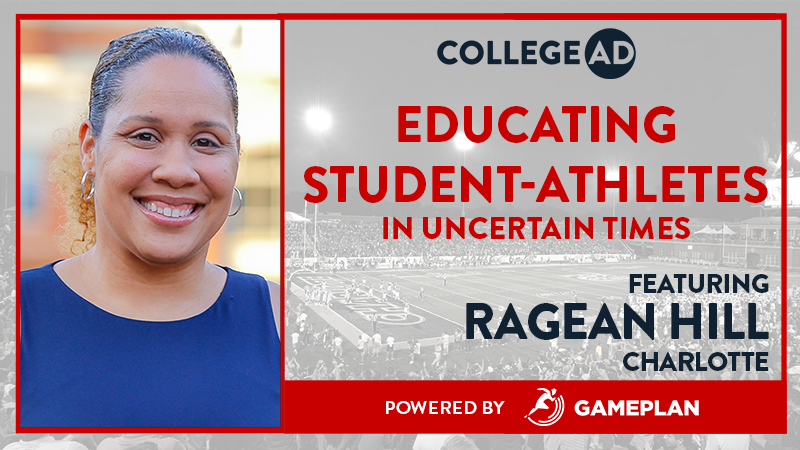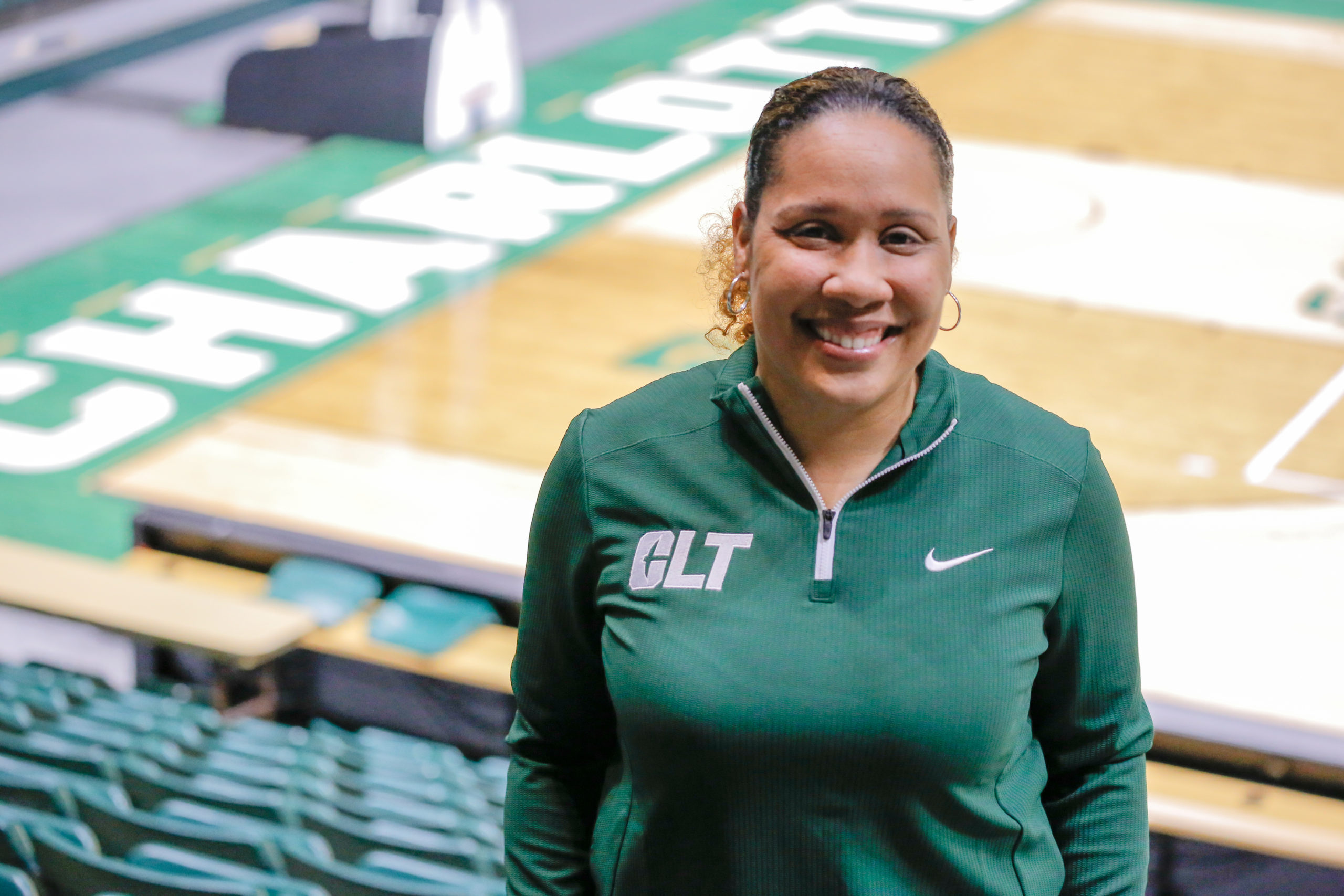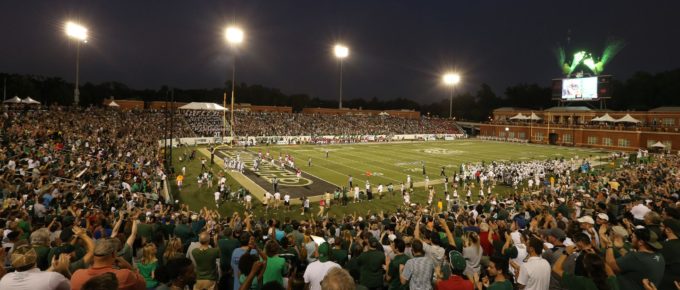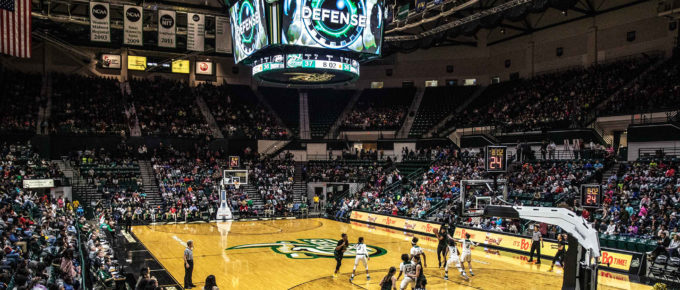
“I would say I always try to provide student-athletes with what I didn’t receive in college as a student-athlete. Resources were a lot different back then especially participating in a non-revenue sport and looking at the layout of the funding; I’m looking at a department as a whole and seeing how we can provide the same thing across the board to all of our athletes at a very high level.” -Ragean Hill
 Ragean Hill is the Executive Associate Athletics Director at Charlotte. Having been a student-athlete herself she understands what kind of relationships it takes to give her student-athletes a one-of-a-kind experience.
Ragean Hill is the Executive Associate Athletics Director at Charlotte. Having been a student-athlete herself she understands what kind of relationships it takes to give her student-athletes a one-of-a-kind experience.
“Having a relationship with your campus partners and not reinventing the wheel, and really integrating our student-athletes in the fabric of the institution, rather than being siloed just to the athletic department is really important. I’ve always tried to think of creative ways to do that.”
She explains that when she transitioned to a mid-major, the resources were different, it allowed her to really hone in on how to develop academic and student-athlete programming while using the resources available on campus.
“My ‘why’ goes back to what I did not receive that would have made me a better overall person when I left college. I want to make sure that our student-athletes do not have any gaps to fill when they get ready to face the real world. ” Again, resources were completely different back then.
 She gave an example of how times have changed for student-athletes from her perspective.
She gave an example of how times have changed for student-athletes from her perspective.
“I was in the sciences getting my degree, those bio classes were a lot different than my elective classes at times. Sometimes, we only had one tutor and we all had to use the same tutor, and you’re trying to figure out which team has top priority. We just knew back then resources were allocated a little bit differently. And now, when you look across all programs, it’s true, what can you provide to all student-athletes no matter the sport? You want to be able to tell families what you are able to provide for their student-athlete from an academic standpoint and that is honest and true.”
She says it’s all about maximizing opportunities for the student-athletes and even with the pandemic, providing a great student-athlete experience is a must.
“Usually, during tutoring sessions, you can have multiple students using the same tutor at the same time from various teams. Now, because we wanted to make sure we were keeping students in their team groups, our academic team basically set up times that each team comes in and to do their study hall. Also, our high at-risk students that have the weekly meetings, may be scheduled as a virtual session.”
She says the level of complexity surrounding the COVID protocols takes up more time, but they still have a commitment to the student-athletes to offer everything they can.
“We overly communicate. If we only had three math tutors come through and we have 400 student-athletes, and we’re trying to work that time. We’re also looking at what does campus have to offer? What do their professors offer during office hours? ? We are trying to go above and beyond to make sure we have a true scope of what can be given. It’s a rule of thumb in a majority of athletic departments, if we can’t offer it, do not bring it up on the recruiting visit, or figure out alternatives that will work within what we have.”
Ragean Hill says that academic achievement and assistance have become front and center in recruitment.
“When you look at all of our sports, you have many students that come in and parents want to know about the curriculum at the institution. If you’re not meeting with the academic advisor during the visit, that it’s just a disservice to your whole program; your operation as a whole. It’s more front and center, but I think I’ve been doing it for a long time, just depending on the athletic program and how many staff members you have that are able to do recruiting.”
 Ragean Hill says that the overall student-athlete experience itself has become a cornerstone of recruitment. It finds its way into everything from fundraising to community engagement.
Ragean Hill says that the overall student-athlete experience itself has become a cornerstone of recruitment. It finds its way into everything from fundraising to community engagement.
“When you want to do more things you obviously have to consider your budget. Right now, we have our United and GOLD initiative. It was created to address and inform on social injustices and help to eradicate racism and discrimination. That leads to me figuring out, ‘who out there has a passion for this area that will help support our initiative?’ In a sense, that’s no different from our student-athlete development and our career services, who would like to sponsor our career night? If it’s not calculated right then in that budget, it’s ‘where can we go or who can we find to raise the money to s support and pay for it?’’
Hill explains that getting the student-athlete experience part of the puzzle right leads to a better experience overall for the university and the students.
“A student who had a good experience graduates, then they can tell others about their great experience. They are now the ambassadors of the institution and the program they played for and then hopefully they become donors.”
She says that the COVID pandemic has required some ‘rethinking’ on the basics like community engagement and mental health.
“Community engagement, we’ve had to rethink that process because we want to protect the student-athletes and that we’re not putting them out in the community to do something that’s good but put them in harm’s way. It’s really just day today. Mental health has been a really big issue and we are trying to mitigate that and give them resources. At the same time limit their time being around people that are not getting tested regularly. That’s probably been the biggest thing is just making sure that they’re all doing okay.”
 She says they are encouraging student-athletes to use the mental health components that are available to them. The university as a whole has worked on erasing the stigma of asking for help.
She says they are encouraging student-athletes to use the mental health components that are available to them. The university as a whole has worked on erasing the stigma of asking for help.
“We want them to use the resources, we have to break down that stigma and get help. We also continue to encourage our coaches to have those conversations and do check-ins with their athletes. During the summer, it was a little hard because everybody was dispersed. Our coaches did a really great job of just setting up weekly zoom meetings with their team. We’ve encouraged supervisors to check-in with their employees, that everything is going okay. I know for me, the reason I’m in the office is because those walls started to close in at my apartment and I just needed to be in a different environment.”
While COVID has made her job challenging, Ragean Hill also sees an opportunity to expand on some of the structures they have put in place. Especially in the area of communication.
“Communication, prior to this sport supervisors would do check-ins with their assigned coaches and/or Mike Hill, but now it’s a weekly meeting with them to give them updates. Our department’s been very transparent in everything that’s going on. We still did our staff retreat, in a sense, we did it virtually. I think communication has been the biggest thing for us and setting up that time to make sure that we’re being as transparent as possible, not only with our staff, our coaches, our student-athletes, but also our donors.”
Hill says their strength right now is being able to switch gears as needed. That flexibility is also something she thinks will last far beyond the current crisis.
“We’ve been pivoting this entire time. We’ve been transparent as a department; I think has helped us tremendously. I think what makes Charlotte so great is great people and a department that understands true teamwork. You go back and you look at your policies and you also look at the operation. When we walk away from this what will we keep, what will become the status quo? For example, we’ve all figured out we can work from home, right? Some positions get more work done at home than being directly in the office every day. Just looking at those things for our employees and how to give them a better work-life or just working situation.”
As for Ragean Hill, she acknowledges that the COVID crisis has been difficult, but there is light at the end of this tunnel.
“I told Mike [AD Mike Hill] early on, I said, this is going to show leadership in the department in this time of adversity. But even for myself, it’s tested me and my patience and giving people grace, and giving myself grace. I know for a lot of us, it’s tested our leadership and everything that we’ve learned in this process is going to make us better and stronger when we come out of it.”
